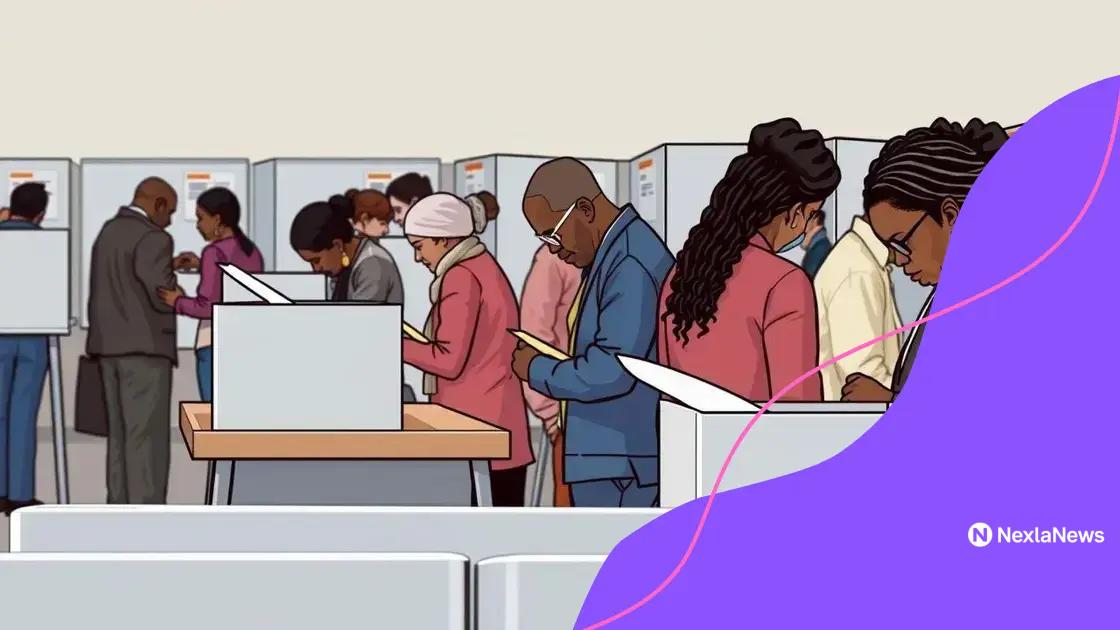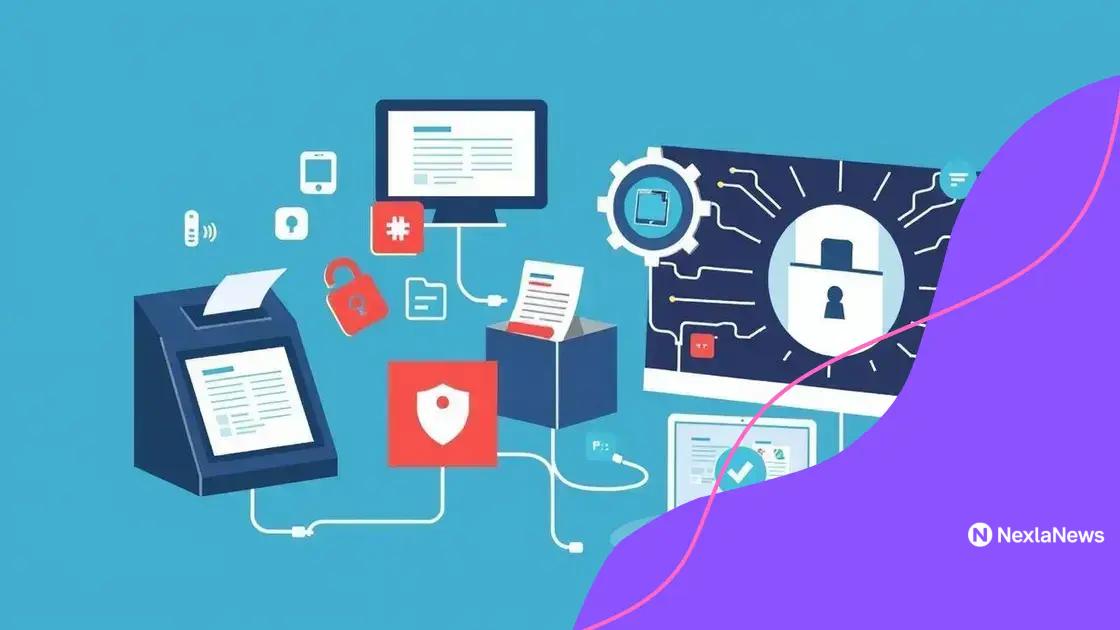Election integrity: Why it matters now more than ever

Election integrity refers to the accuracy and fairness of the electoral process, ensuring that every vote is counted and that elections are conducted transparently and securely to maintain public trust in democracy.
Election integrity is the cornerstone of a functioning democracy. It shapes how we trust our political processes and impacts every citizen’s voice. Have you ever wondered what truly stands behind the fairness of elections in your country?
Understanding election integrity
Understanding election integrity is vital in our democratic society. It refers to the confidence in the election process and its outcomes. When people trust that their votes will be counted fairly, it strengthens democracy.
What is election integrity?
At its core, election integrity means that elections are conducted in a fair, transparent, and secure manner. This includes various elements like proper voter registration, accessible polling places, and accurate vote counting.
When we talk about election integrity, several key factors come into play:
- Fair access to voting
- Accurate vote counting
- Transparency in the electoral process
- Protection against fraud
Importance of election integrity
Ensuring election integrity is essential for maintaining public trust. If citizens believe that elections are unfair, they may disengage from the political process. This can lead to low voter turnout and a lack of representation.
Moreover, a strong commitment to election integrity helps prevent various threats, such as misinformation and fraud. By addressing these concerns, election officials can foster a more secure environment for democracy to thrive.
In addition, implementing measures that promote election integrity can empower individuals, encouraging them to participate actively in the electoral process. When people feel confident about the fairness of elections, they are more likely to vote and engage in discussions about political issues.
Engaging stakeholders for integrity
Various stakeholders play a role in fostering election integrity. This includes government officials, non-profit organizations, and citizens. By collaborating and working towards common goals, these groups can enhance the election process.
- Building alliances with community organizations
- Educating voters on their rights
- Encouraging transparency in election-related decisions
Ultimately, understanding the concept of election integrity not only clarifies its importance but also highlights our collective responsibility in safeguarding our democracy.
Threats to election integrity
Threats to election integrity can undermine the very foundations of democracy. Understanding these threats is crucial for citizens and officials alike. When we recognize what jeopardizes fair elections, we become better equipped to protect them.
Common threats to election integrity
There are multiple factors that can threaten election integrity. These include external interference, misinformation, and even local fraud. Each of these elements can significantly impact public trust in the election process.
- External interference from foreign entities
- Misinformation spreading through social media
- Voter suppression tactics
- Inaccurate voter rolls and registration issues
One major concern is external interference. Foreign involvement in elections is not just a worry in some countries; it is a global issue. Countries around the world have faced attempts to manipulate public opinion or disrupt the electoral process.
Additionally, misinformation poses a serious threat to election integrity. In today’s digital age, misleading information can spread rapidly, misleading voters about candidates, policies, or even the voting process itself. Combating misinformation requires vigilance from both officials and the public.
The impact of voter suppression
Voter suppression is another significant threat that undermines election integrity. Tactics aimed at reducing voter turnout can take various forms, including strict ID laws and limited access to polling places. These strategies can disproportionately affect marginalized communities.
- Limited polling hours
- Voter ID requirements that are hard to meet
- Closure of polling places in minority neighborhoods
By identifying these threats, we can take steps to address them. Protecting election integrity requires a collective effort to monitor, report, and eliminate obstacles to fair voting.
The role of technology in safeguarding elections

The role of technology in safeguarding elections is increasingly vital. It offers tools that can enhance security, improve accessibility, and streamline the voting process. Understanding how technology contributes to election integrity is essential for creating a more trustworthy electoral system.
Election technology tools
Several tools and systems can help protect the election process. From electronic voting machines to online voter registration systems, technology plays a pivotal role. These tools are designed to ensure accurate voting and secure data management.
- Electronic voting machines that reduce human error
- Secure online voter registration platforms
- Ballot tracking systems
- Audit technology for verifying results
Using technology to manage elections can also increase efficiency. For example, digital systems can speed up the counting process and provide real-time updates on voting results. This transparency is key to building public confidence.
Cybersecurity measures
With advancements in technology, there are also heightened risks of cyber threats. Protecting election systems from hacking is crucial. Cybersecurity measures need to be in place to defend against potential attacks on voter databases and electoral infrastructure.
Some effective cybersecurity practices include:
- Regularly updating software and systems
- Training election officials in cybersecurity awareness
- Implementing multi-factor authentication for sensitive systems
By prioritizing cybersecurity within election technology, officials can better safeguard elections from malicious disruptors. This proactive approach is vital for maintaining election integrity.
The use of technology doesn’t just focus on safety; it also seeks to enhance voter experience. Innovations like mobile voting apps or user-friendly interfaces on voting machines can make the electoral process more accessible.
As we move forward, embracing the role of technology in elections will be crucial. By utilizing advanced tools and methodologies, we enhance our capability to protect our democratic processes, ensuring every vote is counted fairly and accurately.
Case studies of election integrity issues
Case studies of election integrity issues showcase how real-world incidents influence public trust. Analyzing these situations helps identify vulnerabilities in the electoral process. Each case provides valuable lessons that can improve future elections.
2016 U.S. presidential election
The 2016 U.S. presidential election highlighted several election integrity concerns. Issues like foreign interference and misinformation campaigns greatly impacted public perception. Reports revealed attempts by foreign entities to influence voter opinions and sow discord through social media.
This case sparked a national discussion about the need for stronger cybersecurity measures in elections. It led to calls for better protection of election infrastructure and increased awareness of election integrity challenges.
Brazil’s electronic voting system
Brazil has long used electronic voting machines, providing a modern approach to elections. Although the system has been praised for its efficiency, it faced scrutiny in the 2018 elections. Critics raised concerns about security and transparency.
In response, Brazil implemented various measures, such as:
- Independent audits of voting machines
- Public demonstrations of the voting process
- Increased public access to official election data
These efforts aimed to enhance public confidence in the election integrity of its system. The Brazilian example shows how addressing concerns can help improve voter trust.
Georgia’s voting changes
In Georgia, changes to voting laws have raised questions about election integrity. The state implemented new ID requirements and limited polling locations, leading to accusations of voter suppression.
Advocates argue that these measures disproportionately affect minority communities. Understanding such case studies is crucial for recognizing how laws and policies can impact democratic participation. These examples highlight the importance of ensuring equal access while safeguarding election integrity.
By examining these case studies, we can gain insights into the various challenges that elections face. Each incident serves as a reminder of the ongoing need to protect the electoral process and ensure fair representation for all citizens.
How citizens can promote election integrity
Citizens play a crucial role in promoting election integrity. Their actions can help ensure that elections are fair and transparent. Engaging in the electoral process empowers individuals and fosters trust within the community.
Educating themselves and others
One of the most effective ways to promote election integrity is through education. Citizens should learn about the voting process, including how ballots are cast and counted. By understanding the system, they can share this knowledge with others, creating a more informed electorate.
Key areas for education include:
- The importance of voter registration
- Understanding voting rights
- The process of how votes are counted
When citizens are well-informed, they can better advocate for their rights and the rights of others, actively participating in a transparent political environment.
Participating in local elections
Active participation in local elections is another way citizens can support election integrity. By voting and encouraging others to do so, they help determine the outcome based on collective decisions rather than silence. Additionally, citizens can attend town hall meetings and engage with local officials.
Such involvement includes:
- Volunteering as poll workers
- Monitoring local election processes
- Reporting any irregularities or concerns
This not only strengthens the electoral process but also builds community trust in democratic systems.
Advocating for policies that protect integrity
Citizens can also advocate for policies that promote election integrity. This can include pushing for legislation that ensures fair voting practices and cybersecurity measures. By contacting representatives and participating in advocacy campaigns, individuals can create a collective voice for change.
Important advocacy points might include:
- Supporting automatic voter registration
- Campaigning for stricter cybersecurity measures
- Promoting transparency in the electoral system
Through such actions, citizens become powerful agents of change, actively defending the democratic process. By focusing on these strategies, individuals contribute to safeguarding election integrity and ensuring a fair electoral process for all.
In conclusion, safeguarding election integrity is a shared responsibility that involves both citizens and officials. By educating themselves and others, participating in elections, and advocating for policies that protect the electoral process, individuals can make a significant impact. Each of these actions strengthens democracy and ensures that every vote counts fairly. Together, we can create a more transparent and trustworthy electoral system for everyone.
FAQ – Questions Frequently Asked About Election Integrity
Why is election integrity important?
Election integrity ensures that all votes are counted accurately and fairly, which is essential for maintaining public trust in the democratic process.
How can I educate myself about the voting process?
You can learn about the voting process by researching your local election laws, attending community meetings, and engaging with reliable online resources.
What actions can citizens take to promote election integrity?
Citizens can vote, monitor elections, educate others, and advocate for policies that enhance transparency and fairness in the electoral process.
How can technology help improve election integrity?
Technology provides tools like electronic voting machines and secure online voter registration, which enhance the security and efficiency of the election process.
